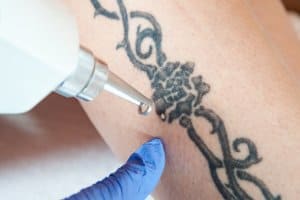
Does laser tattoo removal hurt?
 This is one of the most common questions asked by patients before getting a laser tattoo removal, and for good reason. No one enjoys painful procedures. The answer to this question can vary depending on a few factors, but in the majority of cases laser tattoo removal does cause a fair amount of pain. Some people compare it that of scratching a sunburn or of snapping a rubber band on your skin. Most people say that it hurts less than it did when they got their tattoo. So if you were able to sit through the pain of having the tattoo done, you should be able to get it removed no problem. In most cases patients expect the pain to be much worse than it turns out to be.
This is one of the most common questions asked by patients before getting a laser tattoo removal, and for good reason. No one enjoys painful procedures. The answer to this question can vary depending on a few factors, but in the majority of cases laser tattoo removal does cause a fair amount of pain. Some people compare it that of scratching a sunburn or of snapping a rubber band on your skin. Most people say that it hurts less than it did when they got their tattoo. So if you were able to sit through the pain of having the tattoo done, you should be able to get it removed no problem. In most cases patients expect the pain to be much worse than it turns out to be.
The size of the area will affect how painful it is. The larger the area, the more pain you will notice. There are also certain areas of the body that are more sensitive than others. For example, areas with more fat tend to hurt less. This includes the arms and legs. The fat acts as protection for the bones, which can be a source of pain. Areas with less fat, like the ankles, fingers and neck are much closer to the bones. This tends to cause more pain.
Pain tolerance is also a factor in how unpleasant the experience can be. It’s a good idea to bear in mind that everyone handles pain in their own unique way. These differences can lead to disparate experiences regarding the level of pain that one may perceive. Some people describe their laser tattoo removal session as very painful while others report almost no pain at all. Most people find that they are somewhere between the two extremes. Almost almost all cases, going into the laser tattoo removal process having a positive attitude will make the experience better. It likely won’t be as bad as you are think it will be.
How To Speed Up Tattoo Removal Results?
1. Stress Less:
Do you find yourself stressed out on a daily basis? You’ll have to come up with ways to relieve your stress.
The less stress you have, the less cortisol your body produces, and the lower your cortisol levels are, the better your immune system might be.
2. Stay Hydrated
Your immune system need adequate hydration to function properly, but water can aid in the removal of tattoos in a variety of ways. It improves renal function, allowing toxins like broken-down ink to be flushed out more quickly.
It also aids in the formation of lymph, which transports white blood cells throughout the body, helping them to break down foreign bodies and remove poisons.
Furthermore, water aids in the maintenance of healthy skin. Skin, like all other organs in the body, need adequate hydration in order to operate properly. The more in good shape your skin is, the better it will respond to the treatment.
3. Avoid Brash Sunlight
Sun exposure raises the levels of melanin in the skin, which absorbs the sun’s UV energy.
It’s critical that you don’t have too much melanin in your skin during laser tattoo removal if you’re thinking about it.
Increased melanin levels make your skin more prone to scorching, making it more difficult for the laser to break up the ink pigment.
It is recommended that you keep the tattooed region out of the sun for at least six weeks prior to beginning your treatment in order to have your tattoo erased efficiently and securely in as few sessions as possible.
Are there any alternative methods for tattoo removal besides laser treatment?
Yes, there are alternative methods for tattoo removal besides laser treatment. Some common alternative methods include:
- Surgical removal: This involves cutting out the tattooed skin and stitching the surrounding skin back together. This method is typically used for small tattoos.
- Dermabrasion: This technique involves using a high-speed rotary device to “sand” away the top layers of skin, gradually removing the tattoo.
- Chemical peels: Certain types of chemical peels can be used to gradually fade tattoos by removing the top layers of skin.
Are there any factors that can affect the success of laser tattoo removal?
Yes, several factors can affect the success of laser tattoo removal, including:
- Tattoo color: Darker colors, such as black and blue, are typically easier to remove than lighter colors like yellow and green.
- Tattoo age: Older tattoos are usually easier to remove than newer ones, as the ink may have faded over time.
- Tattoo size: Larger tattoos may require more sessions to remove completely.
- Skin color: Laser tattoo removal is generally more effective on lighter skin tones, as there is less risk of pigmentation changes or scarring.
- Location: Tattoos on areas with more blood flow, such as the face and hands, may be more difficult to remove.
- Health and lifestyle factors: Smoking, poor nutrition, and certain medical conditions can affect the body’s ability to heal and may impact the success of laser tattoo removal.
How long does each laser tattoo removal session take?
The duration of each laser tattoo removal session can vary depending on the size, color, and complexity of the tattoo. However, most sessions last between 15 minutes to an hour. Multiple sessions are usually required to achieve the desired results, with several weeks between each session to allow the skin to heal.
